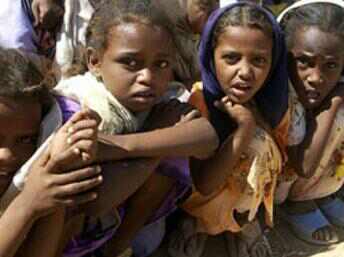Sudan praised for strides made in combating trafficking
June 25, 2014 (WASHINGTON) – Efforts to address trafficking in Sudan have had a measurable impact, according to the US state department’s annual report, earning rare praise from UN agencies and advocacy groups.

The report released on 20 June said international agencies had noted the county’s unprecedented efforts to the point they were now able to work jointly with the government on preventative measures.
Numerous government agencies had also expressed a willingness to engage in dialogue and acknowledged their need for capacity building and training.
“The government demonstrated increased efforts to prevent trafficking. It ceased its public denial of the existence of human trafficking in Sudan and acknowledged the scope and extent of the country’s human trafficking problem,” the report said.
The efforts are in stark contrast to the Sudanese government’s previous public denials of the severity of Sudan’s trafficking problems.
TRANSIT HUB
Eastern Sudan in particular is considered a transit hub for migrants, mostly from Eritrea, who are seeking to reach Europe, Israel or other countries with the help of human smugglers.
Hundreds and possibly thousands of refugees have been kidnapped in eastern Sudan and sold to traffickers in Egypt’s Sinai Peninsula, where they are held and tortured to exhort ransom payments from relatives.
Rights groups have accused Sudan and Egypt of turning a blind eye to this violent trade in men, women and children and in come cases colluding with traffickers.
In March, the Sudanese government announced that it had received financial assistance from the UN refugee agency (UNHCR) to be allocated among the police and other regular forces to combat human trafficking in eastern Sudan.
Sudan also revealed it was implementing measures for controlling refugee camps, disclosing it was cooperating with Ethiopia, and Eritrea to fight against human trafficking.
The report found while the police had investigated and reportedly referred cases of suspected trafficking for prosecution at the federal level during the reporting period, the number of investigations or prosecutions remained unclear.
WOMEN, GIRLS VULNERABLE
Sudanese women and girls, particularly those from rural areas or who are internally displaced due to poverty and conflict, are vulnerable to forced labour as child street beggars and domestic workers in homes throughout the country.
There have been numerous documented cases of Ethiopian and Eritrean women, including undocumented migrants and refugees – and a smaller number of Filipina women – subject to domestic servitude in Sudanese homes, where they experience beatings, sexual abuse, inadequate accommodations, long working hours, confinement and non-payment of wages.
Sudanese women are also vulnerable to similar exploitation as domestic workers in neighbouring Middle Eastern and Gulf countries.
Sudanese girls engage in prostitution within the country, including in restaurants and brothels, at times with the assistance of third parties.
Ethiopian, Eritrean, Somali and possibly Thai women are subjected to forced prostitution in Sudan, with agents luring young women from Ethiopia’s Oromia region with promises of high-paying employment as domestic workers, only to force them into prostitution on arrival in Khartoum.
MORE TO DO
Despite promising new efforts, the government still lacks an inter-ministerial anti-trafficking committee and action plan to coordinate its national efforts, with cooperation among government ministries on trafficking issues also remaining poor.
The report found the government lacked measures for proactively identifying trafficking victims among vulnerable populations or a system of referral to relevant organisations.
The ministry of labour’s national committee for labour markets, tasked with overseeing the work of employment agencies that recruit Sudanese migrants for work abroad, as well as bring foreign workers into the country, provided no information on alleged forced labour violations.
Although it has the authority to revoke agencies’ licences for violations of the labor code and refer cases to criminal courts, it made no efforts to do so during 2013, the report found.
The government’s draft joint action plan with the UN to prevent and end the recruitment and use of children by government forces also remained unsigned at the close of the reporting period after several years of review, while the government’s taskforce on children and armed conflict remained dormant throughout the year.
The annual Trafficking in Persons (TIP) report aims to encourage governmental action and create partnerships around the world in the fight against forms of modern-day slavery.
